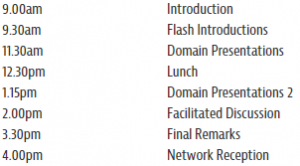Workshop: System Science in Action
Chapin Hall at the University of Chicago and Argonne National Laboratory invite you to participate in the workshop:
System Science in Action
A workshop on the use of system science in policy making
Tuesday, October 3, 2017
1313 East 60th Street
Chapin Hall at the University of Chicago
The goal of this workshop is to share multidisciplinary approaches to system science research, and promote the use of system science to improve the quality of human built systems. Ascertaining and understanding system dynamics enables us to grasp fully the chains of cause-and-effect within human built systems. With a richer understanding of how systems work and why, we can develop more precise policies and deliver higher-quality services. We hope to collaborate in-depth with others to identify best practices in communicating about complex systems, and to discuss how to carry out system-informed research that generates evidence for policy change.
System Science
System science provides theories and methodologies to handle complex problems, which are problems often characterized as ill-defined and open-ended with multiple stakeholder perspectives. Examples of these types of problems include building community resiliency, countering crime and terrorism, reducing gun violence, ensuring energy security, economic development, and delivering human services. Addressing these complex problems requires interdisciplinary approaches to untangle the physical, social, economic, and technological interrelationships. System science resists reductionist approaches that attempt to break complex problems apart to solve them piece by piece. Instead, developing solutions to these problems requires viewing each problem as a system of interconnected components with direct and indirect linkages that adapt as conditions in the problem space change.
From Foster Care to National Security
The work of the research team of Chapin Hall, the School of Social Service Administration, and Argonne primarily focuses on foster care system dynamics. The team has adapted population biology methodologies to look at the system’s resource constraints, and is working with Argonne’s agent-based computer simulation framework to visually represent these dynamics.
The team wants to generalize this conversation to a variety of policy issues and welcomes participants from a range of domains, including but not limited to: Urban Systems, Social Policy Systems, and National Security Systems.
Registration
If you are interested in participating in this workshop, please register by Monday, September 25, 2017, through our online registration form. There are no registration fees associated with this workshop. We do ask participants to register online, since we have a limited number of spots available. You can contact us with any questions at analytics@chapinhall.org.
Agenda
Background
Learn more about the work of Dr. Wulczyn and colleagues on complexity in the foster care system by reading The Center for State Welfare Data’s latest CQIdeas Blog.
